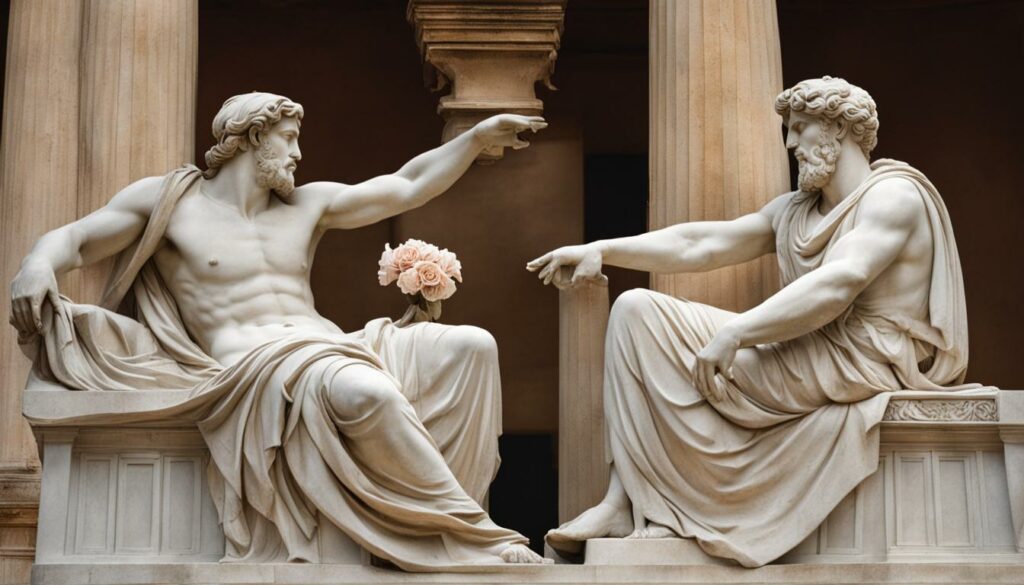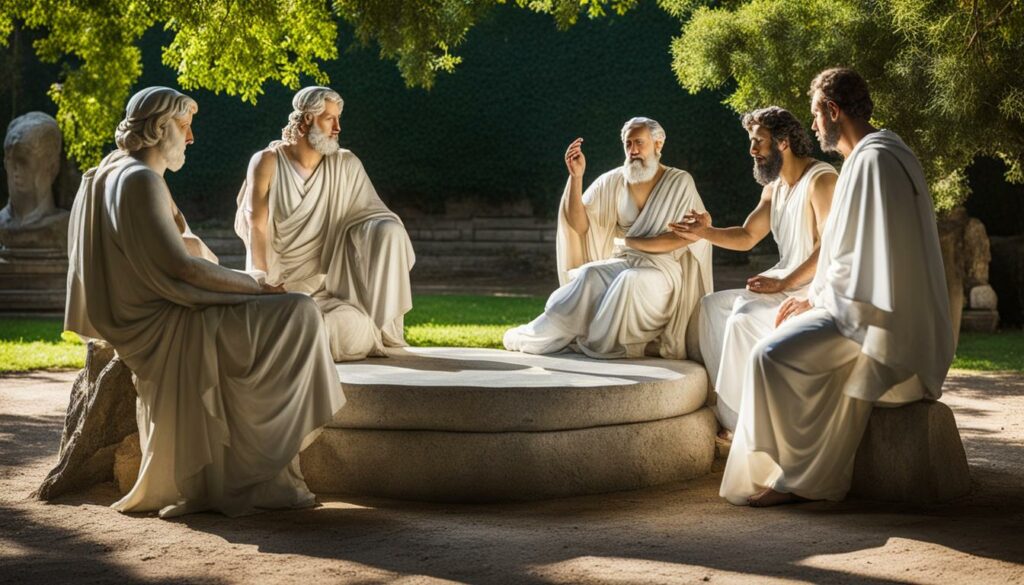Did you know that the Ancient Greeks had multiple words to describe different types of love? Their understanding of love and sexuality went far beyond our modern notions of romance.
Let’s explore the fascinating philosophies and theories that the Ancient Greek love philosophers developed to make sense of the intricacies of human relationships.
Key Takeaways:
- The Ancient Greeks had a deep understanding of love, which they categorized into different types.
- Érōs represented passionate and romantic love, while Agápe embodied selfless and unconditional love.
- Philía referred to deep friendships based on shared experiences and a connection of the mind.
- Ancient Greek philosophies on love and sexuality offer a broader and more nuanced view of intimate connections.
- Exploring these philosophies can help us gain insights into our own understanding of love beyond the modern obsession with romantic love.
Érōs (Romantic Love)
Érōs, derived from the Greek God of Love, was a powerful and passionate type of love that held immense significance in Ancient Greek society. It encompassed desire, romance, and sexual attraction.
This intense form of love evoked feelings of longing and yearning for another person, often leading to deep emotional connections.
Ancient Greek philosophers recognized the potential dangers of Érōs. They understood that this intense passion could control and consume the human mind, causing individuals to behave irrationally or make impulsive decisions in the pursuit of their desires.
Yet, despite its potential destabilizing effects, the Greeks also acknowledged that Érōs had the capacity to evolve into a compassionate and profound love that transcended physical attraction.
Exploring the concept of Érōs provides valuable insights into the Greek views on love and sexual relationships, as well as their understanding of the complexities of human desire. The ancient Greeks believed that love was multifaceted, encompassing various dimensions and evolving throughout one’s life.
“Love is a mighty distempering passion of the soul, threatening a total usurpation thereof, a malady, or rather a tyranny, more grievous than bodily sickness.”
Plato’s Symposium: A Philosophical Perspective
A notable ancient Greek philosopher who delved into the realm of Érōs was Plato. In his renowned work, Symposium, Plato portrays a diverse range of speeches that explore the nature and manifestations of love.
One of the most memorable speeches is that of Socrates, who distinguishes between physical beauty and the beauty of the soul.
Socrates argues that the ultimate goal of Érōs is to ascend from the physical realm of desire and passion to a transcendental love that transcends mere physical attraction.
By redirecting one’s focus towards the pursuit of wisdom, knowledge, and the appreciation of virtue, individuals can cultivate a deeper and more meaningful connection.
The Complexity of Love
Ancient Greek erotic philosophies highlighted the intricate and nuanced nature of love, affirming that it extended beyond mere infatuation or temporary desires. Érōs was seen as a force that could inspire individuals to set aside their selfish inclinations and strive for self-improvement and spiritual growth.
It is through the exploration of concepts like Érōs that we gain a deeper understanding of the ancient Greek perspectives on love and sexual relationships. By examining their rich philosophical heritage, we can enhance our own comprehension of the complexities and depths of human connection.

Agápe (Selfless Love)
In Ancient Greece, Agápe was regarded as the highest form of love. Unlike other types of love, Agápe was characterized by its selflessness and unconditional nature. It transcended personal circumstances and encompassed deep sacrifice.
The Ancient Greeks equated Agápe with the concept of “metta” in Buddhism, which emphasizes universal loving-kindness.
This form of love embraced imperfections, forgave mistakes, and believed in the power of the greater good. It went beyond physical desires and focused on the spiritual and pure aspects of love.
Agápe was not limited to romantic relationships but extended to all human connections, emphasizing compassion, empathy, and the belief in the inherent worth of others.
“Agápe is the love that resides within every individual, ready to be shared unconditionally with the world. It is a divine force that unites us all.”
Ancient Greek Philosophers on Agápe
“Love is born into every human being; it calls back the halves of our original nature together; it tries to make one out of two and heal the wound of human nature.”
– Plato
Philosophers such as Plato and Aristotle pondered the nature of Agápe and its significance. They believed that cultivating this form of love leads to personal growth, moral development, and the attainment of wisdom. Agápe challenged individuals to rise above their own desires and expand their capacity for compassion and kindness.
Philía (Deep Friendship)
Philía, which translates to deep friendship love, was highly valued in Ancient Greek philosophy. This form of love went beyond physical and romantic attraction, focusing on shared experiences and a connection of the mind.
Unlike other types of love, Philía was seen as a virtuous and dispassionate love, emphasizing loyalty, companionship, and sacrifice.
Ancient Greek love philosophers recognized the importance of Philía in human relationships, considering it an essential aspect of love. This deep friendship love was based on equality and mutual respect, allowing individuals to cultivate meaningful connections that extended beyond mere acquaintances.
Similar to Érōs and Agápe, Philía played a significant role in shaping the Greeks’ understanding of love and sexuality. It highlighted the capacity for emotional intimacy and intellectual connection, fostering bonds that were rooted in trust and camaraderie.
This image depicts the intertwined nature of love and deep friendship in ancient Greek philosophy.
The Role of Philía in Ancient Greek Society
Philía permeated various aspects of Ancient Greek society, influencing everything from personal relationships to social and political dynamics. Friends often formed close-knit circles, known as “philos,” which provided a sense of belonging and support.
Philía extended beyond individual connections and had broader implications for society as a whole. Friendships were viewed as crucial for the functioning of a harmonious community, with loyal friendships contributing to the overall stability and well-being of the city-state.
The significance of Philía is exemplified in the writings of renowned ancient Greek philosophers such as Plato and Aristotle. For Plato, friendship served as a means for personal growth and in cultivating a just and harmonious society.
Aristotle, on the other hand, emphasized the importance of virtue in friendships, considering them essential in developing moral character.
Philía in Comparison to Other Forms of Love
While Érōs represented passionate, romantic love, and Agápe stood for selfless, universal love, Philía offered a different dimension of love based on empathy, shared values, and genuine companionship. It represented a love that was grounded in equality and mutual understanding.
| Types of Love | Characteristics |
|---|---|
| Érōs (Romantic Love) | Passionate, romantic, and often associated with desire and longing. |
| Agápe (Selfless Love) | Unconditional, compassionate, and focused on the greater good. |
| Philía (Deep Friendship) | Based on shared experiences, intellectual connection, and loyalty. |
This table provides a concise comparison of the different types of love in ancient Greek philosophy.
The intricate understanding of Philía in ancient Greek philosophy reminds us of the value of deep friendships in our own lives. It encourages us to cultivate meaningful connections based on shared experiences, trust, and mutual respect.
Through the lens of Philía, we can appreciate the lasting impact of true friendship on our personal growth and societal harmony.
Conclusion
The Ancient Greeks possessed a deep understanding of love and sexuality, evident in their diverse range of philosophies and theories. Through their classification of different types of love, they unveiled the intricate nature of human connections.
By delving into these ancient Greek philosophies, we can gain valuable insights into our modern understanding of love, surpassing the prevalent fixation on romanticism.
Greek perspectives on love and sexuality grant us a wider and more nuanced outlook on intimate relationships, emphasizing selflessness, friendship, and the pursuit of a greater good.
FAQ
What were the different types of love in Ancient Greece?
The Ancient Greeks had different words to describe different types of love, including Érōs, Agápe, Philía, Storgí, Ludus, Prágma, and Philautía.
What is Érōs?
Érōs was a powerful and passionate type of love associated with desire, romance, and sexual attraction. It represented intense feelings of longing and yearning for another person.
What is Agápe?
Agápe was considered the highest form of love in Ancient Greece. It was a selfless and unconditional love that transcended circumstances and embraced deep sacrifice.
What is Philía?
Philía referred to a deep friendship love that existed between equals. It represented a love based on shared experiences and a connection of the mind.
How did the Ancient Greeks view love and sexuality?
The Ancient Greeks had a profound understanding of love and sexuality, as reflected in their various concepts and philosophies. Their categorization of different types of love highlights the complexity and depth of human relationships.





